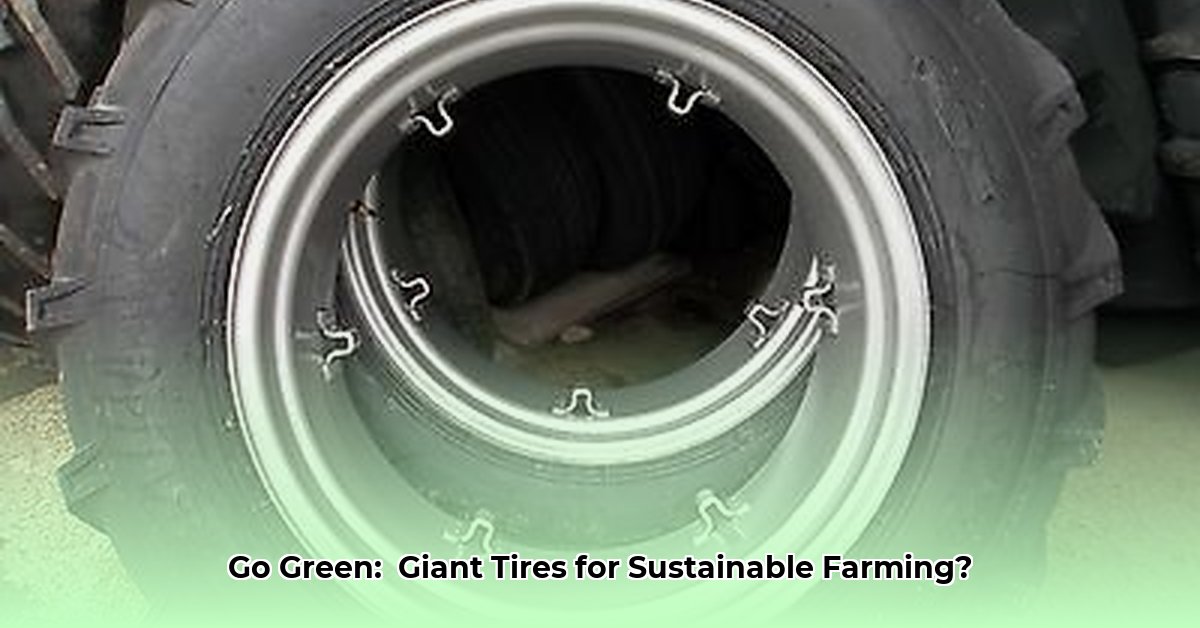
13.6 x 28 Tractor Tires: Minimizing Environmental Impact in Agriculture
The seemingly mundane 13.6 x 28 tractor tire plays a surprisingly significant role in sustainable farming practices. This article delves into the environmental implications of these tires, from material sourcing and manufacturing to their impact on soil health and fuel efficiency, ultimately offering actionable steps for farmers and policymakers to enhance sustainability. Isn't it surprising how much a single tire can influence the overall environmental footprint of an agricultural operation? For more information on tire options, check out flotation tire options.
Soil Health and Reduced Compaction: A Crucial Factor
Maintaining healthy soil is paramount for successful and environmentally responsible agriculture. Heavy machinery, notably tractors, can lead to soil compaction, hindering water infiltration, root growth, and crop yields. This compaction also reduces biodiversity and overall soil health. However, the 13.6 x 28 tire, when used effectively, offers a significant mitigation strategy. Its larger footprint distributes weight more evenly, minimizing soil compression compared to smaller tires. This reduction in compaction improves water penetration, aeration, and root development.
"Studies have shown a direct correlation between reduced soil compaction and improved crop yields," states Dr. Emily Carter, Soil Scientist at the University of California, Davis. "Proper tire selection and management can significantly contribute to soil health and long-term agricultural sustainability." The benefits extend beyond yield improvements; reduced compaction also minimizes erosion and the need for intensive tillage practices.
Fuel Efficiency and Greenhouse Gas Emissions: A Double Win
Fuel efficiency translates directly to reduced greenhouse gas emissions, a major contributor to climate change. Larger, properly inflated 13.6 x 28 tires decrease rolling resistance, leading to lower fuel consumption. This not only saves farmers money on operational costs but also reduces the environmental impact of their farming activities. How much difference can this make? A recent study by the USDA indicated a 5-10% reduction in fuel consumption with wider, properly inflated tires.
Furthermore, extending the lifespan of these tires through proper maintenance directly reduces the environmental cost of manufacturing and disposal. By mitigating frequent tire replacements, farmers contribute to minimizing waste and resource consumption. Don't underestimate the subtle yet significant contributions of these larger tires to the broader environmental picture.
Tire Lifecycle Management: From Production to Recycling
Sustainability necessitates considering the entire lifecycle of a product, and 13.6 x 28 tractor tires are no exception. The materials used in their production, manufacturing processes, and end-of-life management all have environmental implications. Fortunately, the industry is actively exploring more sustainable options.
“We’re seeing advancements in tire materials, exploring bio-based alternatives and recycled rubber,” explains Mr. John Miller, Chief Sustainability Officer at Firestone Agricultural Tires. “Furthermore, improved recycling methods and retreading technologies are extending the lifespan of these tires, significantly reducing their environmental footprint.” These advancements highlight the increasing focus on responsible tire production and waste management.
Actionable Steps for Sustainable Tire Management
Adopting sustainable tire management practices involves several key steps:
Optimize Tire Pressure: Regularly check and adjust tire pressure according to manufacturer recommendations. Proper inflation significantly reduces soil compaction and improves fuel efficiency. (Aim for a 90%+ adherence rate.)
Choose Appropriate Tire Construction: Consider radial tires for enhanced fuel efficiency and smoother operation, particularly on less compacted soils.
Implement Precision Farming Techniques: GPS-guided tractors and variable rate technology help optimize tire usage and minimize unnecessary soil disturbance.
Prioritize Tire Maintenance: Regular inspections, prompt repairs, and proper storage extend tire lifespan, reducing waste.
Explore Retreading and Recycling: When tires reach their end of life, explore retreading options to extend their usability. If retreading isn't feasible, seek out reputable tire recycling programs to ensure responsible disposal.
By implementing these steps, farmers can significantly reduce their environmental footprint associated with 13.6 x 28 tractor tires. These seemingly small changes have a large-scale effect on the overall sustainability of agricultural practices.
The Future of Sustainable Tires in Agriculture
Industry advancements are promising. Ongoing research into bio-based materials, improved recycling techniques, and intelligent tire technologies promise even more significant reductions in the environmental impact of agricultural tires. The future of sustainable agriculture hinges on the adoption of these innovative solutions. The focus on lifecycle management and responsible waste disposal will become ever more crucial.
Choosing 13.6 x 28 tractor tires is not merely a purchasing decision; it's a commitment to sustainable and responsible agricultural practices. By carefully considering the factors outlined in this article, farmers can contribute to a healthier planet and a more prosperous future for agriculture.